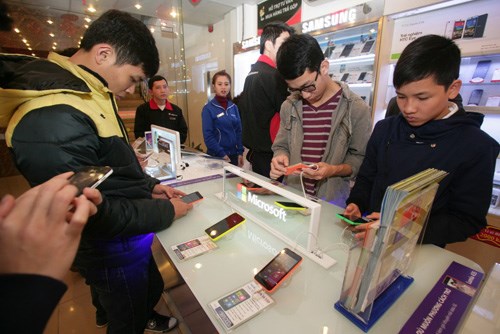
When Singaporean Alvin Koh was running his coffee shop in Hanoi’s Tay Ho district a few years ago, he noticed that it was nearly impossible to track the number of customers who came back to the shop, in essence, their loyalty to the place.
Most of the coffee shops run their loyalty programme using paper cards, which Koh thought was inconvenient for customers because they had to carry too many cards. It was also inconvenient for merchants who could not track the frequency of the coffee-goers.
“I don’t really know how often customers come, whether they come during the weekend or weekdays, or how much they spend,” Koh said. “Sometimes the ladies carry too many bags and they don’t know where their coffee cards are. Sometimes the paper cards go bad because of the rain.”
Inspired partially by the Starbucks Loyalty Programme, which enables Starbucks’ customers to scan their smartphones at the store to gain reward points, Koh and his 10-member team are looking at launching Peko Peko, a mobile platform that allows users to accumulate reward points at coffee shops. It would also allow coffee merchants to track such users and monitor the loyalty programmes the merchants run.
The launch is scheduled to be in Hanoi next month, with the vision of expanding it to other major cities in Vietnam. They now have 10 coffee merchants signed up, and hope to hit 50 by May.
Koh believes Vietnam is among the most attractive emerging markets for start-ups in Southeast Asia because of its young population and many still untapped needs in the market.
“Everyone knows Singapore is a place to start, but it’s not really a place to make money because the market is very small. The population size of Hanoi is like Singapore, and then you still have HCM City and Da Nang,” he said.
Koh was among hundreds of start-up founders attending the two-day Tech in Asia 2016 in Singapore recently, pitching their start-up ideas to potential investors who have the same vision to tap into Southeast Asia’s emerging markets.
On April 19, the news also broke about Alibaba’s expansion into Southeast Asia with the 1 billion USD deal to acquire Lazada, which sells products in Singapore, Indonesia, the Philippines, Thailand, Malaysia and Vietnam. This further validates Southeast Asia’s attractiveness for start-ups and investors alike, with a 600-million mobile-driven consumer market.
Speaking at the conference, Facebook co-founder and Founding Partner of B Capital Group Eduardo Saverin noted Southeast Asia’s lack of infrastructure in many markets in the region as an opportunity to force entrepreneurs to innovate and think outside-the-box.
Besides, the region is a truly mobile-first environment where cheap mobile devices are making it much easier for people to access services and products, according to Saverin.
“ Soon a young girl in rural Indonesia will have more information at her fingertips than I had when I started at Harvard,” Saverin said.
A report released last year by Ericsson suggested that almost two-thirds of mobile phone subscriptions in Southeast Asia and Oceania will be smartphones by 2020, reaching a staggering number of about 800 million people.
In Vietnam, the number of smartphone users is around 22 million, according to some reports, and predicted to reach 26 million in 2016.
The greater availability and affordability of smartphones has paved the way for strong download growth of mobile applications in the region, said Danielle Levitas, senior vice president for research and marcom at App Annie, a California-based business intelligence company and analyst firm.
App Annie considers Vietnam among the frontier markets for mobile application growth, with download growth of mobile applications having risen nearly 60 percent year-on-year in Vietnam (2014-15). Notably, mobile games are undoubtedly a big part of Vietnam’s culture, accounting for nearly half of downloads on both Google Play and iOS in 2015.
The mobile-first environment and densely populated cities in Southeast Asia also make services such as ridesharing or other services in the so-called “sharing economy” continue to thrive, Levitas emphasised.
For Facebook co-founder Saverin, who has continued stepping up his investments in Southeast Asian start-ups, Southeast Asia is also a less crowded market for investors, and governments across the region are rolling out initiatives to support entrepreneurship.
The Vietnamese government has also stepped up efforts to support start-ups and cultivate the spirit of entrepreneurship in the country.
A new set of rules are being drafted by the Ministry of Planning and Investment, aimed towards easing procedures for local and foreign venture capital funds to operate in Vietnam.
The government is ambitious about turning the country into a start-up nation with 5,000 tech firms by 2020. Last month, Deputy Prime Minister Vu Duc Dam called for a renewal in thinking in terms of supporting start-up initiatives to catch up with the rest of the world.
Topica Founder Institute, which offers training courses for start-up founders in Vietnam, estimated that at least 67 tech start-ups in Vietnam received funding last year, with 48 percent of angle/seed deals coming from overseas investors.
Many start-ups in Singapore are also looking at Vietnam for users.
Rinita Vanjre, co-founder and CEO of BonAppetour, is among those. The Singapore-based start-up is about food sharing, connecting home cooks with travellers and foodies, for a unique local dining experience. A local host can post his or her offering on the site, prepare the meal, and then travellers can come to the host’s place to dine.
The concept of dining with strangers, Vanjre admitted, might be harder to take off in Vietnam due to language barriers and the fact that street foods are technically available for most of the day.
However, “there are already people who have expressed an interest in becoming a host on the site,” she said. “So we are very excited about that”.
